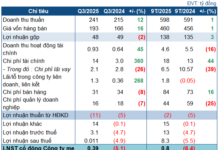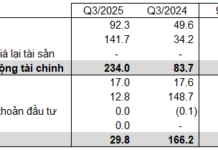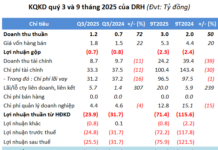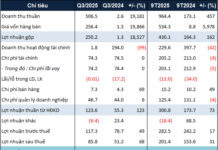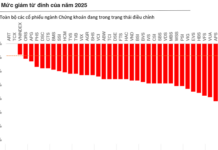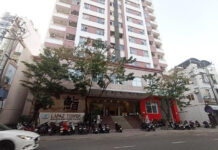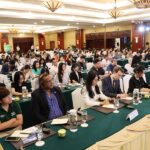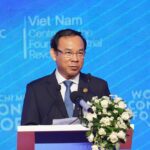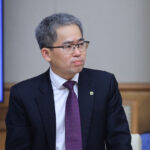The Ho Chi Minh City Economic Forum (HEF) witnessed an insightful dialogue on the theme of “Industrial Transformation: Development Experience and Cooperation Priorities.” The event, held on the morning of September 24, was graced by the presence of city leaders and high-ranking officials, including governors, provincial governors, and deputy ministers from various international provinces, ministries, and sectors from China, Russia, the USA, Japan, South Korea, Germany, Italy, Australia, and India.
Mr. Phan Van Mai, Chairman of the People’s Committee of Ho Chi Minh City, emphasized the urgency of industrial transformation, citing the OECD’s recognition of this global trend, with investments in high technology and digitalization expected to reach approximately 1,500 billion USD by 2030. He underscored the imperative for innovation and sustainable development as key determinants of success in this era of profound industrial change.
According to Mr. Mai, Ho Chi Minh City’s industrial transformation journey is driven by both intrinsic motivation and global trends. On the domestic front, the city needs to transition from traditional industries to high-tech, value-added sectors to maintain competitiveness and sustainable development. Currently, high-tech industries account for only about 23% of the city’s total GDP, and the target is to increase this proportion to 40% by 2030, thereby solidifying the city’s leading position in the country and the region.
Globally, there is a strong shift towards more sustainable and responsible production methods. Mr. Mai referenced a report by McKinsey & Company, which revealed that approximately 70% of multinational companies have committed to reducing their carbon emissions by at least 25% by 2030. Additionally, new-generation free trade agreements, such as the CPTPP, set higher standards by linking trade to sustainable development. To maintain its global market presence, Ho Chi Minh City must meet these standards, Mr. Mai emphasized.
A JOURNEY BEST TACKLED TOGETHER
The report by the Ministry of Science and Technology highlights the potential of investing in digital technologies like AI, IoT, and Big Data to reduce production costs by up to 20% and carbon emissions by 15% per unit of product.
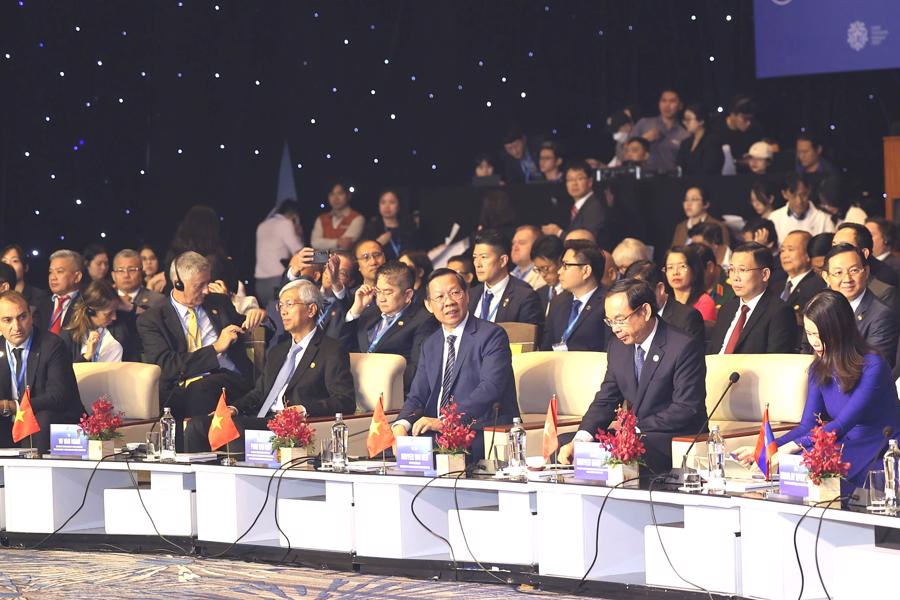
On the other hand, the ILO report indicates that enhanced automation and advanced technology adoption can increase labor productivity by up to 30% in the next decade while reducing natural resource dependence and enhancing competitiveness. To address these challenges, Mr. Mai shared that the city has adopted a dual strategy, combining green and digital transformation.
The city is focusing on developing high-tech industries and investing in automation, smart factories, and advanced manufacturing technologies to upgrade its value chain. Mr. Mai stressed the city’s goal of building a sustainable, inclusive, and resilient economy, aiming to set a benchmark for other localities.
Industrial transformation, as Mr. Mai pointed out, is not a solitary journey. According to the World Economic Forum (WEF), about 60% of successful industrial transformation initiatives result from collaboration between governments, businesses, and citizens, both domestically and internationally. This dialogue, he believes, presents a unique opportunity to exchange experiences, share best practices, and explore new cooperation avenues. Through collective efforts, innovative solutions can be devised to tackle the challenges posed by industrial transformation.
Mr. Mai expressed his hope that through the 2024 Friendship Dialogue, localities, businesses, and citizens would have enhanced opportunities for collaboration and mutual growth. Looking ahead, Ho Chi Minh City pledges to remain a dynamic, open, and sincere partner to global localities. By fostering a spirit of friendship and cooperation, we can not only achieve shared goals but also build a brighter future together.
The 5th Ho Chi Minh City Economic Forum (HEF) in 2024, held from September 24 to 27, centered around the theme “Industrial Transformation: A New Driving Force for Ho Chi Minh City’s Sustainable Development.” The event attracted representatives from over 40 international provinces, ministries, and sectors, including China, Russia, the USA, Japan, South Korea, Germany, Italy, Australia, and India. Among the attendees were 16 governors, provincial governors, deputy governors, and deputy ministers, along with more than 27 domestic and international experts in industrial transformation, innovation, and sustainable development. The forum also witnessed the participation of prominent organizations such as the World Economic Forum (WEF), World Bank, FAO, UNDP, UNIDO, IFC, and C4IR Malaysia.
The Green Growth of Ho Chi Minh City’s Logistics Development
With over 400,000 businesses, including almost 20,000 foreign-invested enterprises, the demand for green logistics from these businesses is immense. Ho Chi Minh City is at the forefront of this, driving sustainable logistics solutions in the industrial transformation.
“A Proposal for a Legal Framework to Facilitate the Transfer of Real Estate-Backed Non-Performing Loans: The OCB CEO’s Vision”
“Furthermore, representatives from OCB proposed that the Government and the State Bank create a robust mechanism for debt handling, similar to Resolution 42, which would facilitate the bank’s seizure and disposal of collateral.”












